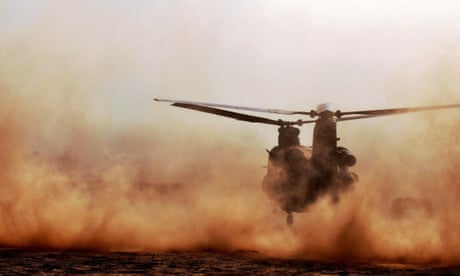Guardian:
Eighty Afghan civilians may have been summarily killed by SAS, inquiry told
Lawyers for bereaved families allege British soldiers carried out policy of terminating all fighting-age men
Eighty Afghans may have been victim of summary killings by three separate British SAS units operating in the country between 2010 and 2013, lawyers representing the bereaved families have told a public inquiry.
One of the elite soldiers is believed to have “personally killed” 35 Afghans on a single six-month tour of duty as part of an alleged policy to terminate “all fighting-age males” in homes raided, “regardless of the threat they posed”.
Afghans were often killed after allegedly producing weapons when separated from their wider family by SAS soldiers, but there were five incidents where the number shot dead exceeded the number of weapons found.

The fresh claims are cited in a document submitted by the law firm Leigh Day, based on previous Ministry of Defence court disclosures, to a new public inquiry into allegations of war crimes committed by SAS soldiers in Afghanistan.
It highlights concerns made by senior army officers in emails from the time, including a warning that “there appears to be a casual disregard for life”. But an internal review that took place in 2011 did not bring about a change in the pattern of killing.
Between June 2011 and May 2013, 25 suspicious deaths were recorded by the lawyers, which included an allegation that in one SAS raid that “resulted in the deaths of 4/5 Afghans” only one grenade was found. The events of the operation were so violent that two Afghan children “had to be urgently evacuated for medical treatment”.
Elite British soldiers from the SAS routinely raided family compounds in search of Taliban fighters, often at night-time, in the latter stages of the UK’s long and bloody military deployment in Helmand province, which ended in 2014.
Leigh Day argues that there were “at least 30 suspicious incidents which resulted in the deaths of more than 80 individuals” between 2010 and 2013, but until now there has been no independent public investigation of what happened.
Last December, ministers announced the creation of a statutory inquiry, led by appeal court judge Lord Justice Haddon-Cave, following growing pressure after a string of investigative reports and civil cases, which alleged that elite British troops repeatedly killed Afghans in cold blood.
It had been previously estimated that there were 54 Afghan victims from a single SAS unit, but the lawyers now argue the allegations cover more British troops and a longer period than previously suggested, and “reveal credible evidence of a widespread and systematic pattern of unlawful extrajudicial killings”.
Military police launched Operation Northmoor in 2014, an investigation into allegations of more than 600 offences by British forces in Afghanistan, including the alleged killing of civilians by the SAS. It was wound down in 2017 by ministers and closed in 2019, and the MoD said no evidence of criminality was found.
The lawyers also argue that in the years that followed, there was “a wide-ranging, multilayered and years-long cover-up” involving senior officers, officials and a range of inquiries. At one point, military police ordered the leadership of the UK’s special forces not to delete any material held on their server.
However, “in direct defiance of that order”, staff at the special forces headquarters “permanently deleted an unknown quantity of data” shortly before military police investigators arrived to examine it.
Full hearings are expected to start in the autumn, but on Wednesday and Thursday Haddon-Cave will decide on a request from the MoD to hold large parts of it secret, without members of the press or public present.
The MoD wants any pieces of evidence that “tend to confirm or deny the alleged involvement” of the SAS itself in Afghanistan to be heard in secret, although it has been the subject of several documentaries, reports and court hearings, and an order granting anonymity to all UK armed forces personnel.
That is being challenged by the Guardian and other media organisations, including the BBC, the Times and the Daily Mail. The lawyers for the bereaved families argue that the public inquiry should “limit the extent” of secret hearings “as far as is possible”, partly because of the seriousness of the allegations.
An MoD spokesperson said it would be up to the inquiry how it conducts its work: “It is not appropriate for the MoD to comment on cases which are within the scope of the statutory inquiry, and it is up to the statutory inquiry team, led by Lord Justice Haddon-Cave, to determine which allegations are investigated.”
No comments:
Post a Comment